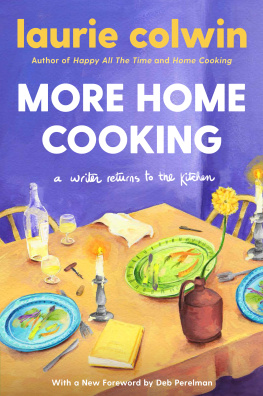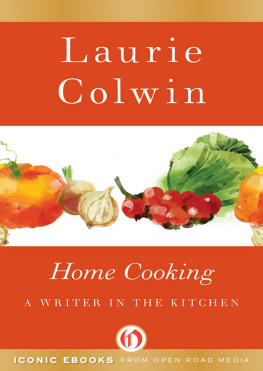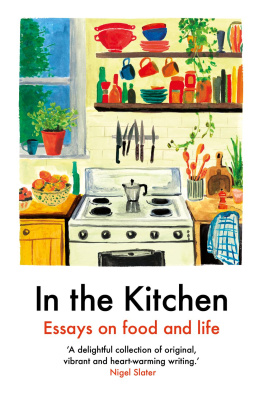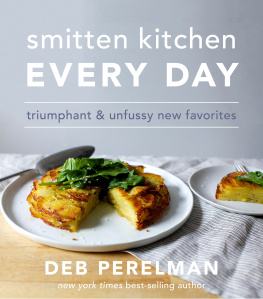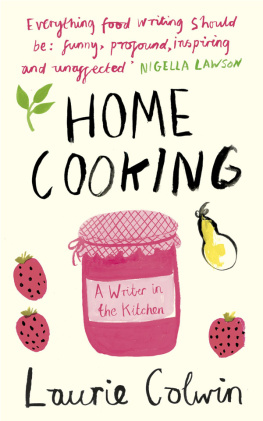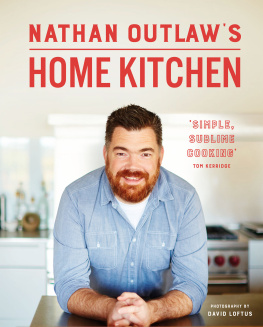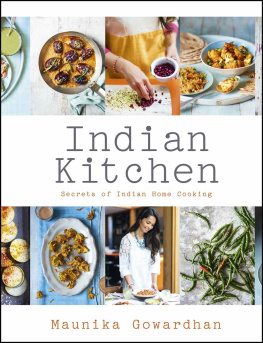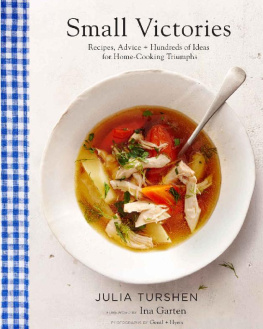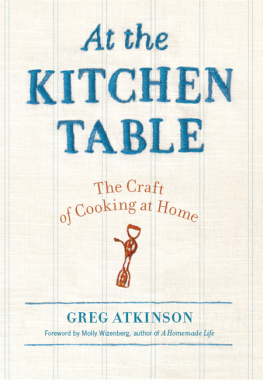Contents
Guide
For Jeanne Heifetz and Rick Kot
Contents
Nobody makes you feel more at home in the kitchen than Laurie Colwin. Her unfussy writing is a balm for kitchen skeptics, and a welcome mat laid out for people who spend a lot of time, borderline-too-much time (if you ask their friends and family) thinking about food and cooking. Her utter lack of pretension, of self-puffery, is enviable and particularly stands out today, when cooks are also supposed to be public figures with social media strategies and good lighting. Her charm and empathy resonate through every reminder of I assure you that if you keep it simple, everything will turn out just fine.
I suspect Colwin is not for everyone. Not everyone starts thinking about what to make for dinner the minute they finish breakfast. Not everyone plans their weekend around a cooking whim they got from a novel they read. Not everyone keeps cookbooks on their bedside table. Not everyone is delighted by an essay about how great lemons are or the perfect meal to serve a jetlagged friend, or is charmed by the idea of eating nursery food as an adult. But for those of us who do, Colwin normalizes all the ways we once thought we were odd.
What is more interesting than how people live? she asks in one of my favorite essays in this book, Why I Love Cookbooks. Maybe war, or death or something, but not to me. I like to know how they serve food, what they do with it, how it looks.
Colwin knows that food people arent obsessed with sustenance per se, they just see it as the prism through which everything else makes sense. She knows that talking about food is the safest way one can be nosy without being rude, because what were really asking when we ask what a friend ate for dinner is: Who came over, what was their favorite thing you made, did they help with the dishes, are they invited back, did you get any good gossip, wait, what do you mean they dont like soup, who doesnt like soup?
This is how it was for me when I first read Home Cooking and More Home Cooking, a year or so after starting a food blog with the hope of finding my people, the kind who wouldnt mind that Id go on for twenty minutes when I was asked the difference between summer and winter squash, expounding on why I totally understand why a lot of people find them bland but its just that they need to make them in one of my four favorite ways, described in detail with a sidebar about the zucchini butter spaghetti I hadnt gotten right yet, but promised to soon. In Colwins writing, I found the friendlier, approachable voice I wished more food writing channeled. Wasnt cooking winter squash for the first time scary enough? Why lecture when you can gently guide?
I knew shed passed away far too young, nearly fifteen years before I discovered her work, but I didnt expect everything shed written to be so relatable that it would feel like it could have been written fifteen minutes ago. So many of her ideas about food are still so current, including her advocacy for buying locally and eating seasonally. She wants our dinner tables to be less old-fashioned and more inclusive of the way real families look: divorced, remarried, from mixed backgrounds, and more, a message as welcome in 1993 and it is in 2021. She understands frugality on a visceral level, discouraging the use of brisket for her boiled beef recipe because there are better ways to cook a childs college fund.
Despite her love for food and cooking, these arent just frivolous meanderings. Theres something very no-nonsense about her writing, whether she deadpans in the introduction that Most people who intend to have a family meal are too busy to think about the cultural relevance of this fact, and thats just page one. Is she wryly looking inward? Is this the perfect jab at us with the privilege to not just consume food, but to analyze it? Is she telling us shes in on the joke, too? It catches me off guard every time I read it, but it also ushers me into a collection that feels as relevant to the way we cook, and live, now as it did decades ago.
She wants us to worry less, enjoy things more, in the kitchen. Colwin is passionate about dinner party menus that are easy but that you can be proud of, the kind she outlines in . If youre feeling overwhelmed, she wants you to know that she suspects that the adults in the perfect-looking family in Norman Rockwells Thanksgiving painting probably had a few bitter words in the kitchen about in-laws, or that she resents doing all of the clean-up. She calls black beans a frazzled persons friend, in a recipe for a black bean soup that several Smitten Kitchen readers have told me is a forever favorite, because black bean soup never goes out of style.
Colwin is keenly interested in helping you make the kinds of decisions inside the kitchen that will give you a good life outside of it, from astonishingly good bread that doesnt lock your day to a strict schedule of kneading, rising, and deflation, to the black bean soup that simmers for five hours, allowing you time to yak on the phone to a friend, play with a child, or go shopping for yourself. She always offers a suggestion for how shed expand on a dish to include friends coming by at the last minute, the kind of impulsivity that sounds positively decadent after a year of social distancing.
But mostly, she wants you to know that cooking is for everyone. You dont need to be a chef genius or come from a long culinary tradition to prepare food, she tells us in Plain Food. You just need to eat something, decide you like it, ask the person who made it how they did it, and take this information back to your own kitchen. Shes anti-souffl and prosimple cake; anti-trussing and protrusting your gut, and I bet shed be absolutely thrilled we are still here, delighting in her timeless encouragement.
Deb Perelman
J UNE 2021
Let us sit down and talk straight about the family dinner, that supposed artifact of years gone by. It is said that these days (in contrast to those days, when families gathered together for at least their evening meal), the family meal has vanished, and what we now are left with is The Snack. No one sits down with anyone anymore. We are a nation, we are told, of people who eat pizza or yogurt on the run, and standing up.
Most people who intend to have a family meal are too busy to think about the cultural relevance of this act. The fact is that modern life has deprived us of lifes one great luxury: time. In the old days things were different. Mom was home, Dad at work, the kids in school. When the old Dodge pulled into the driveway (or as the old Dodge pulled away from the railroad station with Dad inside and Mom driving and the kids in the back) dinner was ready, and then, it is imagined, a cheerful meal was had by all.
Now, of course, everyone works. The morning does not feature a communal breakfast with bacon and eggs and oatmeal (no one eats bacon and eggs anymore, in any case) and the morning is a scramble to get Mom and Dad into their work clothes, children into their snowsuits, lunch boxes packed, and the house pulled together. It is no wonder we look back nostalgically on those supposed heavenly days of yore.
It is my opinion that Norman Rockwell and his ilk have done more to make already anxious people feel guilty than anyone else. I myself am reduced to worm size when contemplating his famous illustration of the farm family Thanksgiving table, with the beaming grandparents and the children with their hair combed. How happy they all look! And how politely and still the children sit! Why cant I get my child to sit like that? And when her cousins come to a family dinner, why do they all wander so much? And when I gaze at Norman Rockwells enchanting Thanksgiving picture, why do I suspect that the grandfather drinks more than he should, that the mother and father have had a few bitter words in the kitchen about the in-laws, or the mom has told the dad how much she resents doing all the cooking when all he has done is watch the football game and never so much as poke his head into the kitchen to ask if she needed help, and that the aunt is taking either antidepressants or mood elevators?

